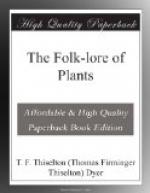Some plants are said to denote riches, such as the oak, marigold, pear and nut tree, while the gathering of nuts is said to presage the discovery of unexpected wealth. Again, to dream of fruit or flowers out of season is a bad omen, a notion, indeed, with which we find various proverbs current throughout the country. Thus, the Northamptonshire peasant considers the blooming of the apple-tree after the fruit is ripe as a certain omen of death—a belief embodied in the following proverb:
“A bloom upon the apple-tree when
the apples are ripe,
Is a sure termination to somebody’s
life.”
And once more, according to an old Sussex adage—
“Fruit out of season
Sounds out of reason.”
On the other hand, to dream of fruit or any sort of crop during its proper season is still an indication of good luck.[7] Thus it is lucky to dream of daisies in spring-time or summer, but just the reverse in autumn or winter. Without enumerating further instances of this kind, we may quote the subjoined rhyme relating to the onion, as a specimen of many similar ones scattered here and there in various countries:[8]
“To dream of eating onions means
Much strife in thy domestic scenes,
Secrets found out or else betrayed,
And many falsehoods made and said.”
Many plants in dream-lore have more than one meaning attached to them. Thus from the, “Royal Dream Book” we learn that yellow flowers “predict love mixed with jealousy, and that you will have more children to maintain than what justly belong to you.” To dream of garlic indicates the discovery of hidden treasures, but the approach of some domestic quarrel.
Cherries, again, indicate inconstancy; but one would scarcely expect to find the thistle regarded as lucky; for, according to an old piece of folk-lore, to dream of being surrounded by this plant is a propitious sign, foretelling that the person will before long have some pleasing intelligence. In the same way a similar meaning in dream-lore attaches to the thorn.




